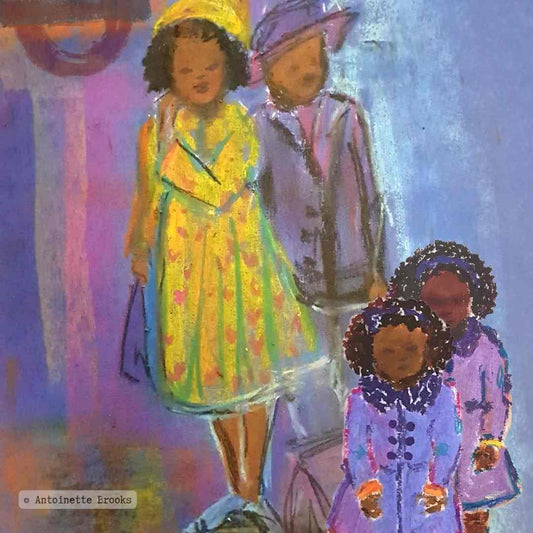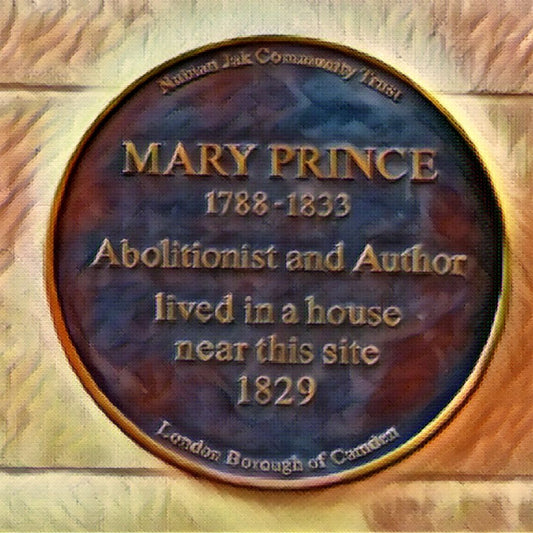This is the story of the struggles and triumph of Mary Prince - a brilliant and brave woman who spent most of her life as an enslaved person in the Caribbean, before travelling to Britain where she told her life story to Thomas Pringle, a key player in the Anti-Slavery Movement.

Please note, this discusses slavery and physical abuse so might be upsetting for some. Discretion advised.
My name is Mary Prince. My last name was actually given to me for fun because my father was an enslaved man who worked as a sawyer helping to build ships. Our captors thought it was funny to give us names of royalty or ancient Roman Emperors. How they laughed because they could order a prince or an emperor around, so my father was called Prince, and that is how I got my last name.
As a small child, I was happy enough. My mother was such a loving and caring woman. I didn't know that I and all those I held dear were born into such a terrible state. And of course I didn't know the pains that adulthood held in store.
I only knew that I played daily with another little girl called Bess. She was a white girl, and I thought that she and I were best friends. I found out later that her grandfather had bought me as a present for Bess, to be her playmate.
We used to have fun, and climb palm trees and run along the sand, but sometimes Bess said, "You belong to me!" and I didn't know what she meant.
When I was aged twelve, Bess's mother died. This was a sad time, and it was made even worse because her father - a harsh, cruel man - decided to remarry. His bride-to-be was proud and flighty. I did not care for her at all and neither did Bess nor my mother, but of course we couldn't say anything.
This new woman decided that she wanted to have the finest wedding Bermuda had ever seen, with a beautifully laced wedding dress, and the tastiest and most delicious foods shipped in. To do all this, would take a lot of money, and that is why my two sisters and I were taken to the market one day - raise money for someone's wedding.
At the Market Square
I remember I was just twelve years old, and I had to stand in the middle of the market square in Hamilton, Bermuda.
I leaned my back against a wall, and my hands covered my chest, and in the distance I could see my mother crying, while other black ladies stood around her, holding her tight and giving her comfort.

Postcard of Hamilton Square, Bermuda
My two younger sisters were clinging to my skirts, and when that horrible day finally ended I had been sold for £57 to a John Ingram who lived at a place called Spanish Point. I can't remember who bought my darling sisters, but I never saw them again.
RELATED ON THE BLOG: Read Memorial to Mary Prince
John Ingham's home was a large and beautiful villa, but I still shudder every time I think about it. The stones and the timber were the best things in it; they were not so hard as the hearts of the owners.
 John Ingham's home where Mary worked, Spanish Point, Bermuda
John Ingham's home where Mary worked, Spanish Point, Bermuda
Every day I took the sheep and cows to pasture, prepared breakfast, fed and dressed their children, rubbed down and fed horses, returned the cattle from pasture and fed them, then prepared supper and readied the Ingham children for bed. All this, and I was only twelve.
Hetty
There was a young girl who worked alongside me. Her name was Hetty. How I loved her.
She was only a few years older than me. She had come from a French-speaking island, and had been found at the bottom of a pirate's ship which was captured by the British. She had been taken to Bermuda and sold to the Inghams, and Mr Ingham and his wife treated her harshly every day.
It was Hetty who comforted me in the first few years without my mother. She taught me how to somehow smile despite our situation. Sometimes the Inghams said, Look at them. They are happy with how we treat them, but that was not true. We were not happy, but Hetty taught me to find some small thing everyday to help me survive.
In the end, even lovely Hetty could not survive the way she was treated, and after she died I was heartbroken. I ran away and lived in the hills for awhile, but my father found me and took me back to the Inghams. I was very cross with my father, but he said as bad as it was, I was safer there than living in the caves and rocks, but it pains me to this day to think of what poor Hetty endured. It was beyond inhumane.
Harsh Treatment
Many years passed. I was sold from one person to another, across the entire Caribbean. From Grand Turks to Bermuda and Antigua. Each person treated me as if I were nothing - just there to work and work hard daily. Many times I had no food to eat, or I was ill and left to die. I remember one time I was sick for days with a fever, and another woman, enslaved like myself, came daily with a small portion of food. If it wasn't for her I would not have survived.
The only joy I had in all that time is that I saw my mother once again. She had had another little girl in the years between. How I loved to see my mother though she was very ill, and I loved my new little sister too. I only spent a week with them before they were both taken to another island, far away from me, but sometimes when I am sad, I think of that memory, and am glad I had that week with them both.
Despite all this, I had a strong heart and spirit. I prayed to God every day for him to help me, I learned to read, and I even took odd jobs so I could save up and buy my freedom, for in those days if you were lucky, you could pay to be set free.
Finally, I travelled with a new family I worked for, the Woods, to England. My poor body was in constant pain because of all the beatings I had endured - foolish me, I thought the English climate would help the pain. Of course it made it much worse.
I Travel to England
The Woods were just as wicked to me as the Inghams and all the other families who I had worked for. Sometimes I reflect, I wonder if these people were always so wicked. I think the fact they own - yes, own - the life of another human being brings out such deep wickedness in their heart that was not there otherwise. That is my only explanation.
One day the English cook who worked for the Woods family was so angered at how they treated me, she refused to work for them again. She told them they were too wicked and she would not serve them.
Later, they beat me again and sent me out in the damp weather to the local laundry where working women gathered to wash clothes. I was so exhausted that I collapsed in front of all these dear ladies, and when I came to, they had seen all the scars and welts across my body and were greatly angered by this.
They told me that there were laws in England, and I did not have to stay with someone who treated me so badly. Afterward, they took me to a man called Thomas Pringle who ran the Anti-Slavery Movement. He and his wife were very kind to me, and I told them my story and it was written down. They did not write every thing I told them, I think they thought it would be too hard for people to hear, but they wrote enough so the people of Britain had some understanding of what life was life for me every day. And not just me, but for every black woman in the Caribbean.

Thomas Pringle, Anti-Slavery Movement.
“To be free is a sweet thing,”
- Mary Prince
I was the first black woman in British history to tell their own life story, and the Wood and Ingham families were very angry with me and said it was not so, but all I did was tell the truth as the scars across my legs and back proved.
Much later, it was said that by telling my life story I played a crucial role in the abolitionist movement, and I am glad of it. For too many of our people suffered. I stood up in court and told the truth, and for that I now realise I was brilliantly brave.
Share or comment on this article, The Struggles and Triumph of Mary Prince, Abolitionist


